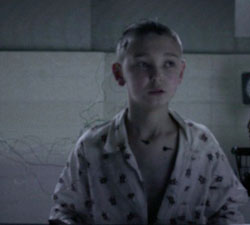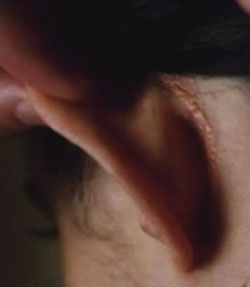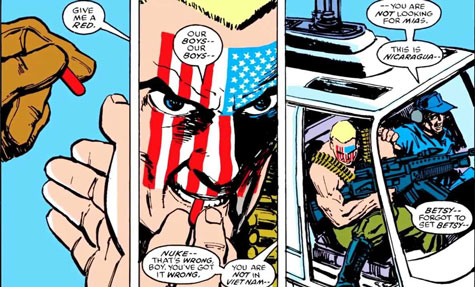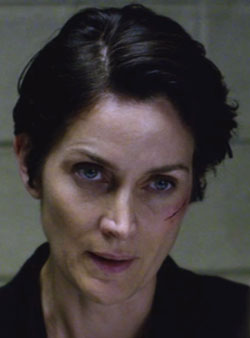
Hello and welcome back once again to my look at Marvel's Jessica Jones series. Today, we've reached the penultimate installment of my 4 part feature where we'll look at Episode 8 “AKA WWJD?”, Episode 9 “AKA Sin Bin,” and Episode 10 “AKA 1,000 Cuts.”
You know how last time I talked about how much of a monster I thought Kilgrave (David Tennant) was? Well, these episodes were a reminder that monsters are born, not made. But they also illustrated another thing I talked about last time, the power of choice. We see 3 monstrous figures in this episode and ultimately they all choose the paths they walk down. They know what they're doing is wrong and hurts others, but they choose self-interest, despite it all.
So, once again, we had some riveting episodes full of powerful drama and insane twists and turns. Let's take a look at these events, the characters involved, and the role that established Marvel Comics characters and concepts play in them.
Since we're talking about monsters, I feel like we should start with Kilgrave. We find out a lot more about him in these episodes. Surprisingly, yes, I did feel a little sympathetic towards him, but only a little.
In episode 8, we get Kilgrave's view on his origin story, and then in episode 9, we get his parents take on what really happened. If, like Jess (Krysten Ritter), you believe Kilgrave's parents—and I do—they performed some pretty harsh experiments on their little boy in order to save his life. When the side effects of the virus gave him his persuasive powers, they were forced to cater to the whims of a child for years. When he made his own mother burn her face with an iron, his powers had become too much to handle and they abandoned the son (and monster) they had helped to create.
 So, to some degree I think, yes, Albert (Michael Siberry) and Louise Thompson (Lisa Emery) bear some responsibility for their young son Kevin (James Freedson-Jackson) becoming Kilgrave. Perhaps they could have been clearer with Kevin why they were doing the things they were doing. That still may not have worked, but at the very least they could have alerted an organization like S.H.I.E.L.D., which we know from movies like “Ant-Man” was active in the '80s. Instead, they left their son on his own to lash out and twist other people into his puppets.
So, to some degree I think, yes, Albert (Michael Siberry) and Louise Thompson (Lisa Emery) bear some responsibility for their young son Kevin (James Freedson-Jackson) becoming Kilgrave. Perhaps they could have been clearer with Kevin why they were doing the things they were doing. That still may not have worked, but at the very least they could have alerted an organization like S.H.I.E.L.D., which we know from movies like “Ant-Man” was active in the '80s. Instead, they left their son on his own to lash out and twist other people into his puppets.
That by no means gets Kilgrave off the hook for the monster he becomes. The way he talks to people in these episodes makes it very clear that he knows what he does is awful. We see him argue semantics a number of times to excuse his actions. When Jessica claims he raped her, he doesn't quite deny it; rather, he retorts by saying that he hates the word rape.
It seems to me that what he's done is carefully construct a narrative that allows him to act on all his petty whims regardless of who gets hurt. He's essentially a super powered child in the body of a man, which Jessica conveys in Episode 8 when she lambasts Kilgrave, telling him that he's not 10 anymore. He's like a vicious, spoiled child who has the ultimate means of getting his own way.
 I think that also explains a lot of his gross, pseudo-romantic behavior towards Jessica. He refuses to treat her like a human being. He's constructed a fictitious account of their relationship and refuses to believe anything that contradicts his narrative. That's especially clear in Episode 10 when you get the flashback from Kilgrave's point of view about a moment from their past. Then, you get what really happened from Jess's perspective—and she’s got the nasty scar to back it up.
I think that also explains a lot of his gross, pseudo-romantic behavior towards Jessica. He refuses to treat her like a human being. He's constructed a fictitious account of their relationship and refuses to believe anything that contradicts his narrative. That's especially clear in Episode 10 when you get the flashback from Kilgrave's point of view about a moment from their past. Then, you get what really happened from Jess's perspective—and she’s got the nasty scar to back it up.
So, I can somewhat sympathize with Kevin, but I still hate Kilgrave's guts. It was fun watching all the different ways Jess beat him down physically in these episodes. I especially love the knockout punch she nailed him with in Episode 10.
Another monster we see emerge in these episodes is Officer Will Simpson (Wil Traval). If you were watching Episode 9 with a friend who has some comic knowledge like me, they probably freaked out when Simpson told Dr. Koslov (Thomas Kopache), “Gimme me a red.” That's because it was an official confirmation that Will Simpson is the Marvel Cinematic Universe's take on Frank Simpson—AKA Nuke, a brainwashed and violent super soldier who made his debut in the 80's during Frank Miller's celebrated run on Daredevil.

When they first introduced Simpson, I thought he might be Nuke, but the different first names threw me off. So, it was a fun, little surprise to see that confirmed. Simpson, of course, does not have the comic Nuke's signature American flag face tattoo, but there was a nice little homage to it in Episode 9—the lighter he carried had an American flag emblazoned on it. Also, in his initial appearance, the comic version of Nuke described American soldiers as “our boys,” and in these episodes, Simpson refers to the soldiers in his former spec ops unit as his “boys.”

The comic version of Nuke is also a somewhat sympathetic character if you know his history. He's undergone a number of physical tortures that shattered his mind, and he's often used as a pawn by larger and more sinister forces.
I don't have much sympathy for the Jessica Jones version of Nuke though. Yes, he bears some emotional scars from his manipulation at the hands of Kilgrave, and we see in Episode 8 that he's become fearful of gifted people. That fear causes him to take some rash actions, and at the end of Episode 8, he pays for them by being caught in an explosion. That, of course, only exacerbates his fear and hatred of Kilgrave and gifted people, which, as we see in Episode 9, causes him to abuse the red pills Doctor Koslov gave him.
Simpson's transformation into full-blown monster becomes complete in Episode 10 when he murders Detective Clemmons. I was infuriated to see that because:
- Clemmons was becoming an interesting character and I would have loved for him to become Jessica's police contact.
- He was played by the great Clarke Peters.
So it was like Simpson murdered Detective Lester Freeman, the character Peters plays on The Wire, and one of my favorite characters on TV.
The lab experiments done on Simpson, Kilgrave, and the other children in the videos on the yellow flash drive raise some very interesting questions for the rest of Marvel's Cinematic Universe.
Who is ultimately behind these experiments, and what are they trying to do with them? Is this the work of a shadowy arm of the U.S. Government, a terrorist organization like Hydra, or something completely different?
It also beautifully calls back to a moment in the feature film Captain America: The First Avenger, where Doctor Erskine (Stanley Tucci) talks with Steve Rogers (Chris Evans) about the importance of staying a good man. Clearly Officer Will Simpson was not a good man.
The actions and consequences of our 3rd monster in these episodes should serve as a cautionary tale to those who may want to exploit or take advantage of the gifted. Of course, I’m talking about Jeri Hogarth (Carrie-Anne Moss) who thought she could manipulate Kilgrave or perhaps duplicate his powers for her own gain. That ambition left her bloody, ended the life of her spouse Wendy (Robin Weigert), and caused her to lose Pam (Susie Abromeit)—who in Episode 10 says she doesn't recognize the person claiming to be her lawyer.
It seems to me what transformed Jeri into a monster was her willingness to take shortcuts. In past episodes, we saw that she's willing to lie and even tamper with juries to win a case. So, I think the moral line for her keeps on being redrawn. Couple that with what she told Hope Schlottman (Erin Moriarty) about life and how you have to fight like hell to hold to what is yours, and you have a very dangerous person.
 Jeri showed just how dangerous she is when she chose to keep the remains of Hope Schlottman's aborted fetus in the hopes that she could use it to replicate the powers of Kilgrave. Also, in Episode 9, she chooses to free Kilgrave in return for him persuading Wendy to sign the divorce papers.
Jeri showed just how dangerous she is when she chose to keep the remains of Hope Schlottman's aborted fetus in the hopes that she could use it to replicate the powers of Kilgrave. Also, in Episode 9, she chooses to free Kilgrave in return for him persuading Wendy to sign the divorce papers.
What's especially scary is that Jeri is still out there. The way she was talking to Pam in the interrogation room suggests to me that we've only begun to see the nastiness Jeri Hogarth is capable of.
So, Episodes 8-10 features some nasty, villainous characters, but they also showcase some pretty heroic deeds. Both Jess and Trish (Rachael Taylor) continue to show inspiring amounts of courage and altruism. It would have been so easy for them to end the life of Kilgrave, an act that is arguably justified at this point, but if they did, they would be sacrificing the freedom and possibly the life of the innocent Hope Schlottman.
We also get some more insight to Jess’s character in Episode 8 when we meet her family in the flashbacks. It was interesting to see how much the guilt of her family's death in a car accident haunts Jessica, and how this enforces the idea that she needs to “make it right.” I think that, and having someone as optimistic and genuinely good as Trish believing in her, is why Jessica goes to the lengths she does for what's right.
Note: It was interesting to see that the writers of the episode paid homage to Jessica's co-creator Brian Michael Bendis by naming Jess's TV parents after him and his wife Alyssa.
It will be interesting to see how far she will have to go in her final battles with Kilgrave and what fallout will result from them. Plus, when will Luke Cage come back into the story? I desperately want to find out the answers to those questions. So, what do you say we go watch episodes 10-13?
I'll see you back here soon for my thoughts on the last 4 episodes and my final thoughts on Season 1.
